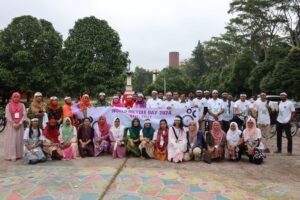During the foundation-stone laying ceremony of the Real Estate and Housing Association of Bangladesh’s (REHAB) training institute building in Uttara, Dhaka, State Minister Nasrul Hamid emphasized the need to amend the Real Estate Development and Management Act – 2010. He stressed that such amendments are crucial to promote good practices, ensure accountability within the sector, and sustain business operations effectively.
Highlighting the significance of the REHAB Training Institute in shaping the housing sector’s workforce, Minister Nasrul Hamid expressed optimism about the institute’s potential to address skill gaps prevailing in the construction management domain of the country. He underscored the importance of enhancing construction efficiency and learning from developed countries’ practices to expedite building projects.
The state minister urged REHAB to prioritize the design and construction of energy-efficient apartments while ensuring timely delivery of flats or plots to customers. He emphasized the importance of customer satisfaction and the role of REHAB in upholding their commitments.
Anticipating a more dynamic workforce in the housing sector with the establishment of the REHAB Training Institute’s dedicated building, Minister Nasrul Hamid expressed hope for significant progress in skill development initiatives.
Alamgir Shamsul Alamin, President of REHAB, elaborated on the institute’s evolution since its inception in 2015, highlighting its contributions to nurturing skilled manpower in the housing sector. He emphasized the need for a dedicated building to address practical education requirements and expressed satisfaction that the institute would soon have its own premises.
Responding to inquiries, REHAB officials informed The Business Standard that construction work for the building is expected to commence within a month. They projected a timeline of three years for the completion of the building, after which training activities will commence at the new facility.
Notably, the REHAB Training Institute has already trained 10,000 students who are now employed across various housing and development firms, underscoring its significant contribution to the sector’s workforce development.








